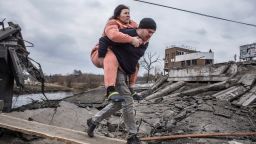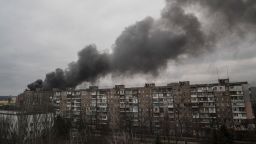US President Joe Biden on Tuesday announced his administration is banning Russian oil, natural gas and coal imports to the US in response to the Russian invasion of Ukraine, a step he warned could lead to a spike in gas prices at home.
“Today I am announcing the United States is targeting the main artery of Russia’s economy. We’re banning all imports of Russian oil and gas and energy,” Biden said in remarks from the White House. “That means Russian oil will no longer be acceptable at US ports and the American people will deal another powerful blow to Putin’s war machine.”
Here are key things to know about Biden’s announcement today:
How we got here: Sanctions on Russia’s oil and gas industry had once been viewed as mostly off the table as officials in the United States and Europe worried about a global spike in prices. But pressure had been growing on Biden to act, including from Ukraine’s President and American lawmakers from both parties, as Russia’s onslaught in Ukraine increasingly targets civilians.
The US expected to make the move unilaterally, without its European allies, due to disagreement among European nations about whether to ban Russian energy imports. EU countries have significantly more exposure to Russian energy than the US. Not long before Biden’s announcement, the United Kingdom announced that it planned to phase out Russian oil imports by the end of the year.
Americans will feel the impact at the pump: Biden emphasized in his remarks that his decision will likely hurt Americans at the gas pump.
“The decision today is not without cost here at home,” Biden said. “Putin’s war is already hurting American families at the gas pump. Since Putin began his military build-up at Ukrainian borders, just since then, the price of gas at the pump in America went up 75 cents and with this action it’s going to go up further. I’m going to do everything I can to minimize Putin’s price hike here at home.”
The President also warned companies against price gouging during a time of crisis.
“To the oil and gas companies and to the finance firms that back them: We understand Putin’s war against the people of Ukraine is causing prices to rise. We get that. That’s self-evident. But, but, but, but — it’s no excuse to exercise excessive price increases or padding profits or any kind of effort to exploit this situation or American consumers, exploit them. Russia’s aggression is costing us all. And it’s no time for profiteering or price gouging,” Biden said.
The move comes as gas prices skyrocket in the US as Russia’s invasion of Ukraine rocks the global oil market. The average price for a gallon of regular gas broke its 2008 record, hitting $4.14 on Monday, according to the Oil Price Information Service, the firm that collects and calculates prices for AAA. That breaks the previous record of $4.11 a gallon that has stood since July 2008.
Energy imports from Russia: US imports from Russia make up a small slice of American energy portfolio — roughly 8% in 2021, of which only about 3% was crude oil. White House economic officials have been engaged for more than a week as to how to manage any decision to cut off those imports, officials say. The Department of Energy reported that in the last two weeks of February, Russian oil imports dropped to zero as US companies cut ties with Russia, effectively implementing their own ban.
Impact on Russian economy: The sanctions the West has slapped on Russia following its unprovoked invasion of Ukraine had so far exempted oil exports.
Biden said the package of economic sanctions and export controls the US has already imposed on Russia has been causing “significant damage to Russia’s economy,” and that the value of the Russian ruble has tanked since Putin launched his attack on Ukraine.
“One ruble is now worth less than one American penny,” Biden said. The President said Russia would not be able to boost the value of the ruble because the West has cut off Russian’s largest banks from the international financial system.
The President noted major companies independently have suspended their services in Russia, including Visa, Mastercard, American Express, Ford, Nike and Apple.
“The private sector is united against Russia’s vicious war of choice,” Biden said.
Read more about the announcement here and see Biden’s full executive order here.




















